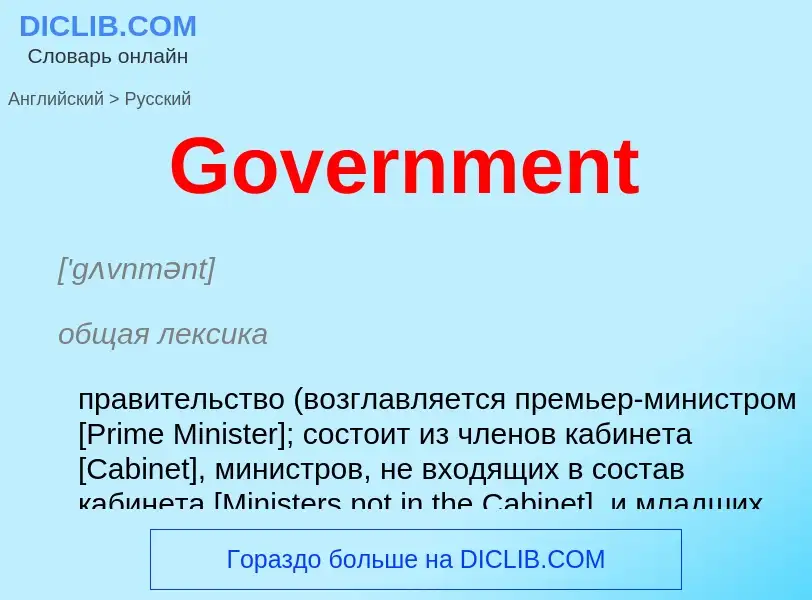Translation and analysis of words by ChatGPT artificial intelligence
On this page you can get a detailed analysis of a word or phrase, produced by the best artificial intelligence technology to date:
- how the word is used
- frequency of use
- it is used more often in oral or written speech
- word translation options
- usage examples (several phrases with translation)
- etymology
Government - translation to English
['gʌvnmənt]
общая лексика
правительство (возглавляется премьер-министром [Prime Minister]; состоит из членов кабинета [Cabinet], министров, не входящих в состав кабинета [Ministers not in the Cabinet], и младших министров; обыкн. насчитывает ок. 100 чел.)
полное выражение
Her /His/ Majesty's Government
синоним
['gʌv(ə)mənt'gʌv(ə)nmənt]
общая лексика
государственный
Смотрите также
существительное
общая лексика
(часто Government) правительство
форма правления
управление
руководство
провинция (управляемая губернатором)
штат
правительство
провинция (управляемая губернатором)
профессионализм
государственные ценные бумаги
Wikipedia
A government is the system or group of people governing an organized community, generally a state.
In the case of its broad associative definition, government normally consists of legislature, executive, and judiciary. Government is a means by which organizational policies are enforced, as well as a mechanism for determining policy. In many countries, the government has a kind of constitution, a statement of its governing principles and philosophy.
While all types of organizations have governance, the term government is often used more specifically to refer to the approximately 200 independent national governments and subsidiary organizations.
The major types of political systems in the modern era are democracies, monarchies, authoritarian and totalitarian regimes. Historically prevalent forms of government include monarchy, aristocracy, timocracy, oligarchy, democracy, theocracy, and tyranny. These forms are not always mutually exclusive, and mixed governments are common. The main aspect of any philosophy of government is how political power is obtained, with the two main forms being electoral contest and hereditary succession.

![Separation of powers in the [[US government]], demonstrating the ''trias politica'' model Separation of powers in the [[US government]], demonstrating the ''trias politica'' model](https://commons.wikimedia.org/wiki/Special:FilePath/Separation of powers.png?width=200)
